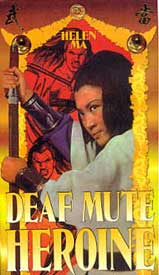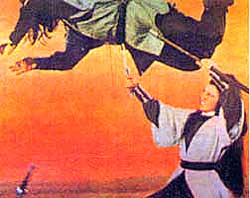 Produced by Wong Toh & directed by Wu Ma for the independent studio StarScope, The Deaf & Mute Heroine (Long e jiang, 1971) is a fine cross between the films of King Hu & the more rapid direction of almost everyone else.
Produced by Wong Toh & directed by Wu Ma for the independent studio StarScope, The Deaf & Mute Heroine (Long e jiang, 1971) is a fine cross between the films of King Hu & the more rapid direction of almost everyone else.
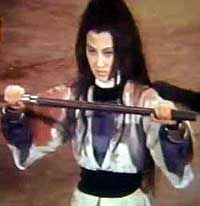 The lighting is subdued for most of the scenes, giving the main character a brooding, mystic presence. The plot is coherent, which alas cannot be said of the majority of wuxia. The lighting is subdued for most of the scenes, giving the main character a brooding, mystic presence. The plot is coherent, which alas cannot be said of the majority of wuxia.
The fighting is very beautifully staged & choreographed, without too much of wire-fu unrealism to the encounters. It's one of the few swordswoman films to equal the power of The Lady Hermit (Zhong kui niang zi, 1971).
Helen Ma (or Hoi Lun Ma) creates the title role. She is stockier & stronger looking than the majority of kung fu action actresses, but every bit as beautiful. She looks the warrior part more than most.
As is the case in King Hu's The Fate of Lee Khan (Ying chun ge zhi feng-bo, 1973), in which Helen Ma is also featured, the villain is an impressive woman warrior in her own right.
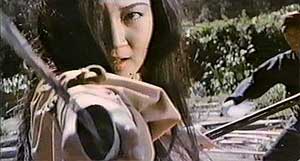 Ma as the Deaf Mute Heroine is pitted against casino operator Miss Liu (Shirley Wong Qui-lee), a woman who fights with swords & with somewhat unlikely boomerang knives. Ma as the Deaf Mute Heroine is pitted against casino operator Miss Liu (Shirley Wong Qui-lee), a woman who fights with swords & with somewhat unlikely boomerang knives.
The character of the deaf & mute heroine varies from the average in some key factors: Although she seems on the surface to be the typical pure-minded & innocent swordswoman so often portrayed, in fact her motivation throughout the film is, simply, to possess several hundred large pearls which will make her rich. Scarcely a noble quest or one of honor or revenge. Her enemies wish pretty much for the same thing.
But the casino operator, villainous as she is, yet has an additional motivation. She must avenge the death of her brother, killed by the deaf-mute heroine while stealing the pearls the second time. It would seem the casino owner has at least one noble intention, then, but the deaf-mute remains, throughout, a murdering thief.
The makers of this film seem cognizant of their character's ambiguity, & have created a fascinating portrait as a result: a corrupt, thieving individual who is nonetheless basically naive, innocent, likeable, & most assuredly capable of love.
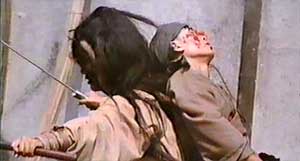 There is a character-element from the plot of the Beijing Opera White Snake here, too. The deaf-mute, like the heroines from White Snake, falls in love with a rather stupid fellow, who is pleasant & good-looking, but rarely clever, a gentle cloth-dyer named Yang Shung (Tang Ching).
There is a character-element from the plot of the Beijing Opera White Snake here, too. The deaf-mute, like the heroines from White Snake, falls in love with a rather stupid fellow, who is pleasant & good-looking, but rarely clever, a gentle cloth-dyer named Yang Shung (Tang Ching).
Like the husband of White Snake, the deaf-mute's fiance is easily tricked into betraying her. The hapless fellow redeems himself by giving his life for the deaf-mute, whereas in White Snake, the women give their lives for their stupid, untrusting husband (proving, thereby, their humanity).
But the cloth-dyer was a nurturing loving fellow & for him the deaf mute heroine attempted to live a "normal" family life, giving up the sword.
Their romance is believable with a streak of the bittersweet. And when it finally becomes necessary for her to return to her loner's road with her sword, it has a bold sadness that rings so much truer than in the majority of wuxia, which have a tendency to sacrifice authenticity of emotion for mere colorfulness.
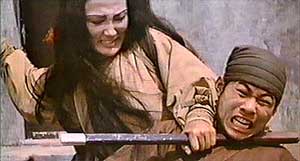 Helen Ma looks comfortable & powerful in her role. Because she cannot hear, she wears silver wristbands that serve as mirrors so that she can guard her back. She is more than a gifted fighter, though, & proves her intellect when deprived of her wristbands.
Helen Ma looks comfortable & powerful in her role. Because she cannot hear, she wears silver wristbands that serve as mirrors so that she can guard her back. She is more than a gifted fighter, though, & proves her intellect when deprived of her wristbands.
She survives the handicap in numerous ways (including strapping one of her enemies to her back so that a rear attack only injures him). The film is packed with swordfights, yet manages to save enough room for more plot & characterization than usually seen. It's a special film.
The deaf & mute concept could have rendered the characterization weak. Western filmgoers have no doubt run into the mute female character in numerous American films.
Such a character is usually mute because of an hysterical reaction to something terrible she has seen; & she speaks only when some brave man cures her fears with his big protective arms.
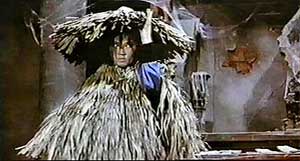 Western viewers are additionally subjected to the "silent savage" cliche, usually as an American Indian who never speaks, is very dangerous, but gets a duly deserved bullet in the end. Western viewers are additionally subjected to the "silent savage" cliche, usually as an American Indian who never speaks, is very dangerous, but gets a duly deserved bullet in the end.
So a deaf-mute heroine could have resembled these basically racist & sexist stereotypes. Instead, she's dead-center the Strong Silent Type, except for the Strong Silent Type is nearly always male.
Helen invests the character with true strength & dignity. Indeed, she seems a positive role model for people who may have speech or hearing impairment -- not that deaf mutes should take up sword, kill, & steal pearls, but it must be nice for handicapped persons to see a screen hero now & then who even being shy of utter perfection, at least refuses to be limited by handicap.
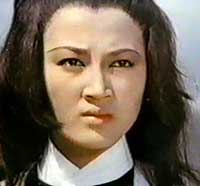 I watch a lot of Hong Kong & Taiwan costume martial arts movies & usually have to keep my expectations low, as the majority of these films aren't quite intelligent to say the least. I watch a lot of Hong Kong & Taiwan costume martial arts movies & usually have to keep my expectations low, as the majority of these films aren't quite intelligent to say the least.
If a fan of swashbuckling adventure films from China only wants to see examples that are as good as the best art films from around the world, then that won't leave many to watch. One learns to lower expectations & love certain elements of any given film while overlooking the same film's failings.
But a picky-picky viewer who wanted the ordinary & the lousy weeded out of their viewing schedule, that selective soul would certainly find The Deaf & Mute Heroine remained firmly on the list of must-sees. It's simply a wonderful film.
copyright © by Paghat the Ratgirl
|
